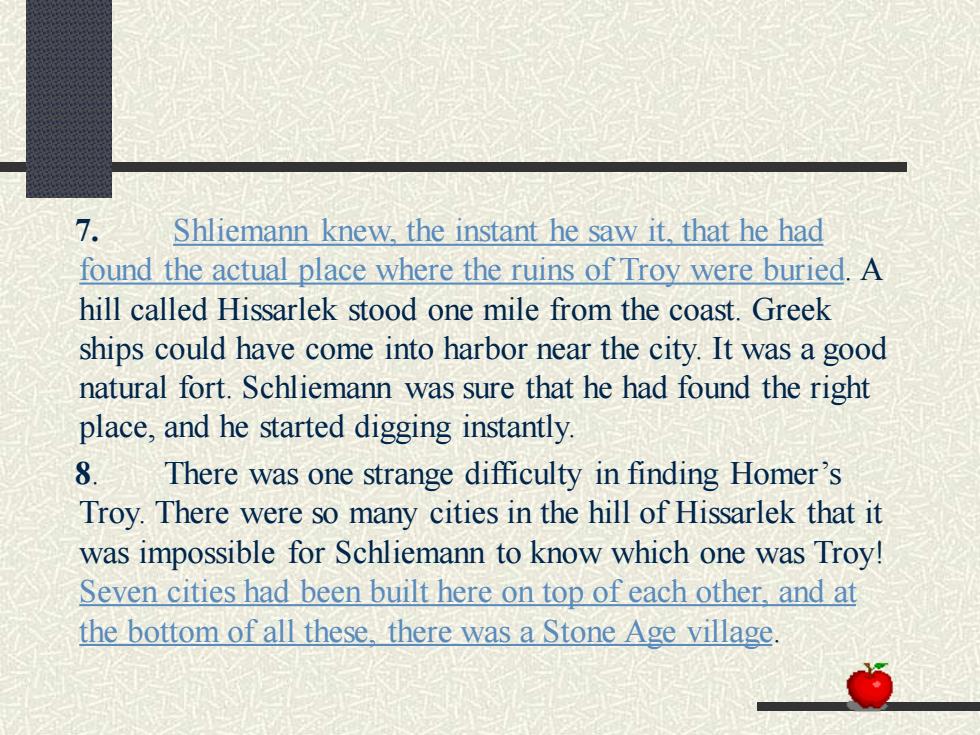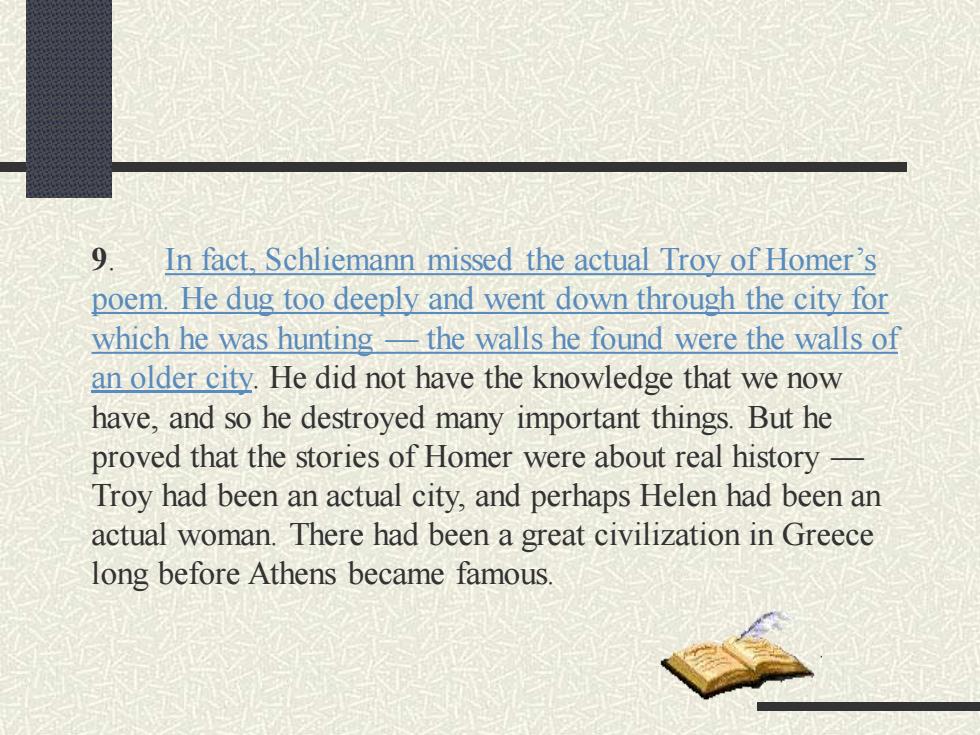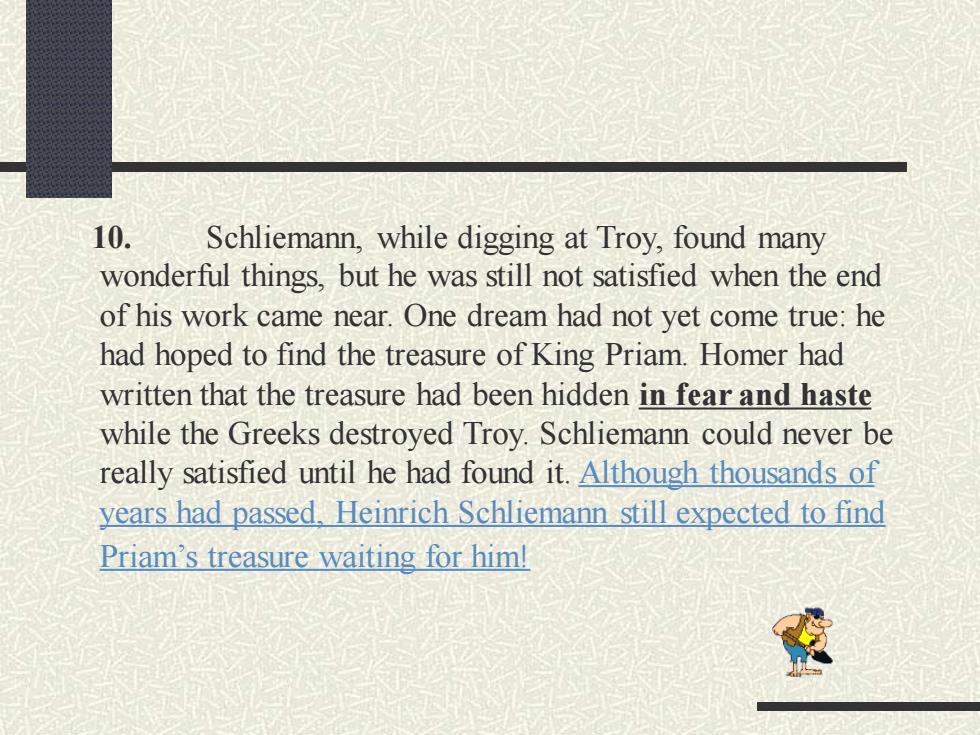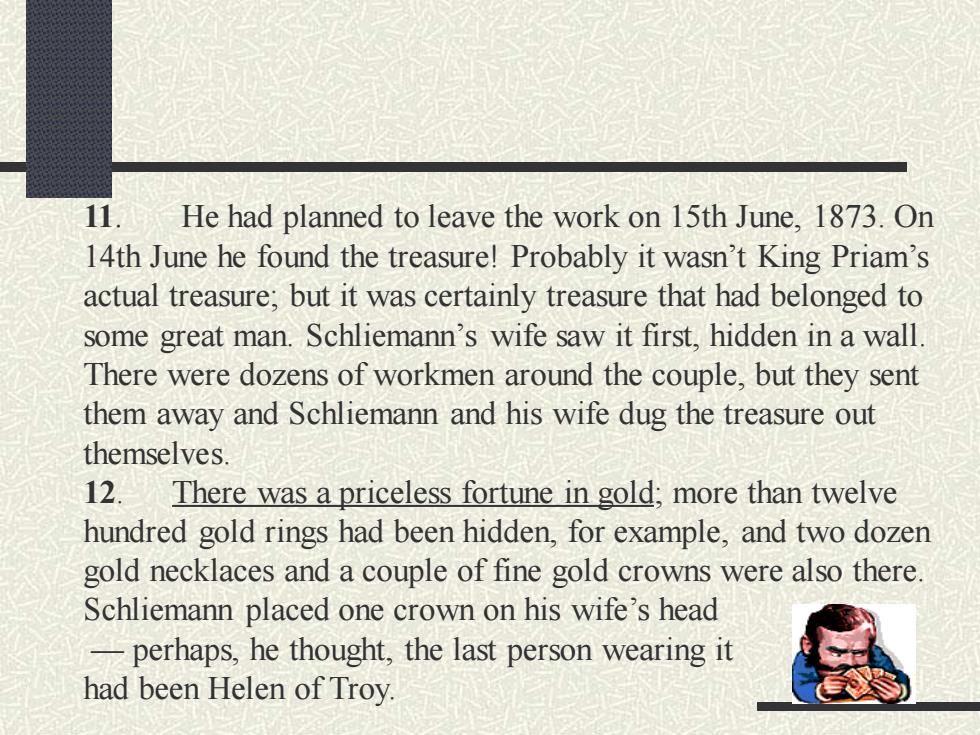
7. Shliemann knew,the instant he saw it,that he had found the actual place where the ruins of Troy were buried.A hill called Hissarlek stood one mile from the coast.Greek ships could have come into harbor near the city.It was a good natural fort.Schliemann was sure that he had found the right place,and he started digging instantly. 8. There was one strange difficulty in finding Homer's Troy.There were so many cities in the hill of Hissarlek that it was impossible for Schliemann to know which one was Troy! Seven cities had been built here on top of each other,and at the bottom of all these,there was a Stone Age village
7. Shliemann knew, the instant he saw it, that he had found the actual place where the ruins of Troy were buried. A hill called Hissarlek stood one mile from the coast. Greek ships could have come into harbor near the city. It was a good natural fort. Schliemann was sure that he had found the right place, and he started digging instantly. 8. There was one strange difficulty in finding Homer’s Troy. There were so many cities in the hill of Hissarlek that it was impossible for Schliemann to know which one was Troy! Seven cities had been built here on top of each other, and at the bottom of all these, there was a Stone Age village

9.In fact.Schliemann missed the actual Troy of Homer's poem.He dug too deeply and went down through the city for which he was hunting-the walls he found were the walls of an older city.He did not have the knowledge that we now have,and so he destroyed many important things.But he proved that the stories of Homer were about real history- Troy had been an actual city,and perhaps Helen had been an actual woman.There had been a great civilization in Greece long before Athens became famous
9. In fact, Schliemann missed the actual Troy of Homer’s poem. He dug too deeply and went down through the city for which he was hunting — the walls he found were the walls of an older city. He did not have the knowledge that we now have, and so he destroyed many important things. But he proved that the stories of Homer were about real history — Troy had been an actual city, and perhaps Helen had been an actual woman. There had been a great civilization in Greece long before Athens became famous

10. Schliemann,while digging at Troy,found many wonderful things,but he was still not satisfied when the end of his work came near.One dream had not yet come true:he had hoped to find the treasure of King Priam.Homer had written that the treasure had been hidden in fear and haste while the Greeks destroyed Troy.Schliemann could never be really satisfied until he had found it.Although thousands of years had passed,Heinrich Schliemann still expected to find Priam's treasure waiting for him!
10. Schliemann, while digging at Troy, found many wonderful things, but he was still not satisfied when the end of his work came near. One dream had not yet come true: he had hoped to find the treasure of King Priam. Homer had written that the treasure had been hidden in fear and haste while the Greeks destroyed Troy. Schliemann could never be really satisfied until he had found it. Although thousands of years had passed, Heinrich Schliemann still expected to find Priam’s treasure waiting for him!

11. He had planned to leave the work on 15th June,1873.On 14th June he found the treasure!Probably it wasn't King Priam's actual treasure;but it was certainly treasure that had belonged to some great man.Schliemann's wife saw it first,hidden in a wall. There were dozens of workmen around the couple,but they sent them away and Schliemann and his wife dug the treasure out themselves. 12.There was a priceless fortune in gold;more than twelve hundred gold rings had been hidden,for example,and two dozen gold necklaces and a couple of fine gold crowns were also there Schliemann placed one crown on his wife's head -perhaps,he thought,the last person wearing it had been Helen of Troy
11. He had planned to leave the work on 15th June, 1873. On 14th June he found the treasure! Probably it wasn’t King Priam’s actual treasure; but it was certainly treasure that had belonged to some great man. Schliemann’s wife saw it first, hidden in a wall. There were dozens of workmen around the couple, but they sent them away and Schliemann and his wife dug the treasure out themselves. 12. There was a priceless fortune in gold; more than twelve hundred gold rings had been hidden, for example, and two dozen gold necklaces and a couple of fine gold crowns were also there. Schliemann placed one crown on his wife’s head — perhaps, he thought, the last person wearing it had been Helen of Troy

13. Archaeologists are still digging at Troy and are still finding interesting things.Slowly they are separating one city from another;they are examining every spoonful of earth.But patient digging was not work that Schliemann enjoyed,he was only satisfied with big finds.When he had found a treasure he wanted to move on.Having found Priam's treasure he was then ready to leave Troy. 14. Once more he was determined to dig in a place that Homer had described,and his next intention was to follow King Agamemnon from his victory at Troy back to his own city of Mycenae in Greece.Mycenae had been a grander city than Troy; Homer had called Mycenae rich in gold'and Schliemann was always eager to find more treasure
13. Archaeologists are still digging at Troy and are still finding interesting things. Slowly they are separating one city from another; they are examining every spoonful of earth. But patient digging was not work that Schliemann enjoyed; he was only satisfied with big finds. When he had found a treasure he wanted to move on. Having found Priam’s treasure he was then ready to leave Troy. 14. Once more he was determined to dig in a place that Homer had described, and his next intention was to follow King Agamemnon from his victory at Troy back to his own city of Mycenae in Greece. Mycenae had been a grander city than Troy; Homer had called Mycenae ‘rich in gold’ and Schliemann was always eager to find more treasure